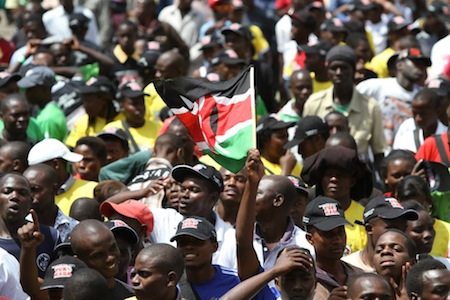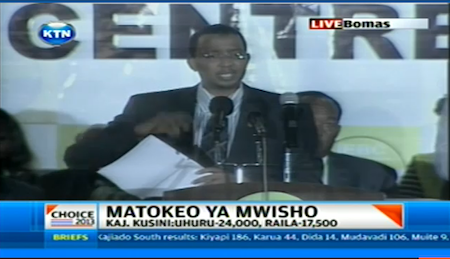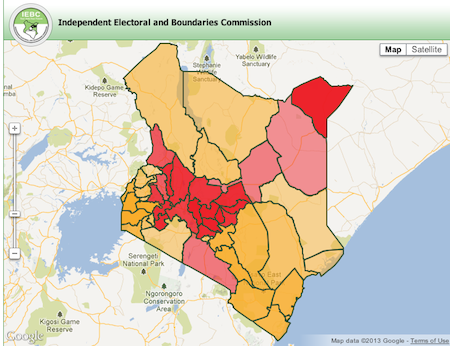
Kenya — a country of 41 million people in east Africa — widely seen as a relatively stable hub for international actors in the east African region will go to the polls on March 4, 2013, to select a new president and the members of Kenya’s newly redesigned parliament.
The most high-profile race is the one to replace Kenya’s third president since independence, Mwai Kibaki, who is stepping down after his election in 2002 and his controversial reelection in 2007, widely seen as a fraudulent victory and a catalyst for political violence that lasted for two months following the 2007 election.
The two leading candidates are Uhuru Kenyatta, a former finance minister and the son of Jomo Kenyatta, the country’s first president, and Raila Odinga, the son of Jaramogi Oginga Odinga, Kenya’s first prime minister. Odinga (the son) narrowly lost — officially, at least — the 2007 election to Kibaki, and since a 2008 power-sharing deal with Kibaki, has served as prime minister.
Kenyatta leads an alliance of parties known as the Jubilee alliance, which is dominated by members of Kenyatta’s own Kikuyu ethnic group, the largest in Kenya (17%) and the Kalenjin people. Odinga leads the Coalition for Reforms and Democracy (CORD) alliance, comprised in turn of Odinga’s own Luo people, as well as the Kamba people.
The key issues in the race have involved corruption, Kenya’s somewhat lackluster economic growth and unemployment, the indictment of Kenyatta (and his running mate, William Ruto) for crimes against humanity by the International Criminal Court springing from the 2007-08 political violence, the ongoing devolution of power from the central government to Kenya’s eight provinces and 47 counties, and the progress of land reform resulting from the Independent Land Commission established by the 2010 constitution.
Six other candidates are contesting the race, although none of them receive more than single digits in polls. They include:
- Musalia Mudavadi, deputy prime minister, a former vice president, former running mate of Kenyatta in 2002 and a former running mate of Odinga in 2007, who is running as the candidate of the Amani coalition, which includes many supporters from the Luhya people and the once-dominant Kenya African National Union (KANU), and Mudavadi has the support of former president Daniel arap Moi, who served from 1978 to 2002.
- Peter Kenneth, an MP who is running as the candidate of the Eagle Alliance, and is running on an explicitly national basis (i.e., not on the basis of a particular ethnic group).
- Martha Karua, an anti-corruption MP and a former minister of justice.
- Mohammed Abdula Dida, a high school teacher known mostly for his folksy one-liners in Kenya’s two presidential debates.
- James ole Kiyiapi, a former permanent secretary in the ministries of education and local government.
- Paul Muite, a former MP.
Under new election rules resulting from a new constitution promulgated in 2010, a presidential candidate must win in excess of 50% of the vote and win 25% of the vote in at least 24 of Kenya’s 47 counties. If neither condition is met, the two candidates will face off in a runoff to be held on April 11.
Kenya’s parliament is also gaining a house after the 2010 constitutional reforms — the formerly unicameral National Assembly will remain as the lower house, while the new Senate will become the parliament’s upper house.
The National Assembly, formerly consisting of 224 members, will now have 350 members, 290 of which are directly elected in single-member districts and 47 of which must be women (one in each Kenyan county).
Kenyans will elect members of the Senate for the first time ever on March 4 as well — it’s expected that there will be 68 senators, one elected in each of the 47 counties, with 16 additional special representatives for women, two representatives for youth and two representatives for persons with disabilities.
Currently, the largest bloc in the National Assembly is the Odinga-led Orange Democratic Movement (100 seats), followed by Kibaki’s Party of National Unity (43 seats), though because of the transient nature of many Kenyan political parties and movements, it’s uncertain whether pro-Kenyatta or pro-Odinga forces will actually win the new elections for the National Assembly and the Senate.
See below Suffragio‘s coverage of the Kenyan races:
Kenyan Supreme Court upholds Kenyatta victory
March 30, 2013
Uhuru Kenyatta is the next president of Kenya
March 8, 2013
Tense Thursday finds both Uhuru, Raila under 50% in Kenya election results
March 7, 2013
The latest on Kenya’s election results: IEBC targets Friday finale
March 6, 2013
What we know so far about the Kenyan election results
March 5, 2013
Could Kenya enter another period of power-sharing after its general election?
March 4, 2013
Mudavadi likely to become kingmaker in Kenya’s presidential runoff
March 3, 2013
Five reasons why Kenya is unlikely to repeat 2007’s post-election violence
March 1, 2013
Live-blogging the final Kenyan presidential debate
February 25, 2013
Making sense of Kenya’s ethnopolitical alliances
February 19, 2013
Kenyatta, Ruto cleared to run in Kenyan election despite ICC woes
February 18, 2013
![]()


